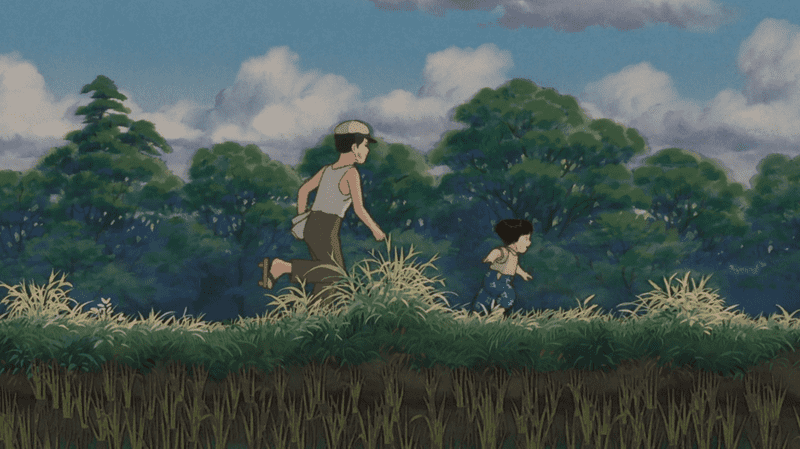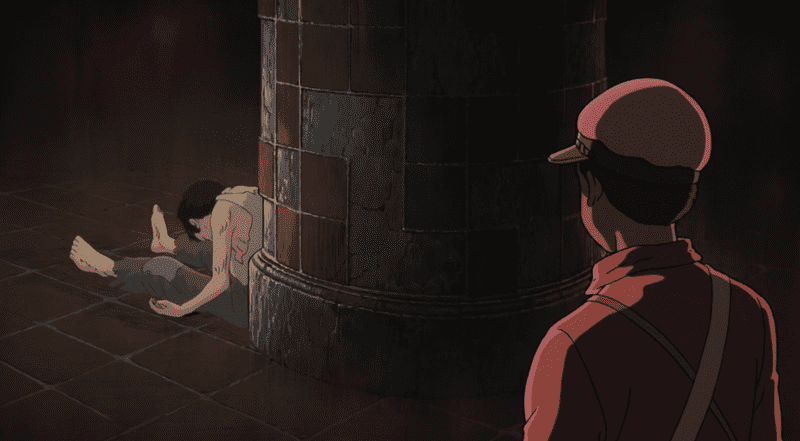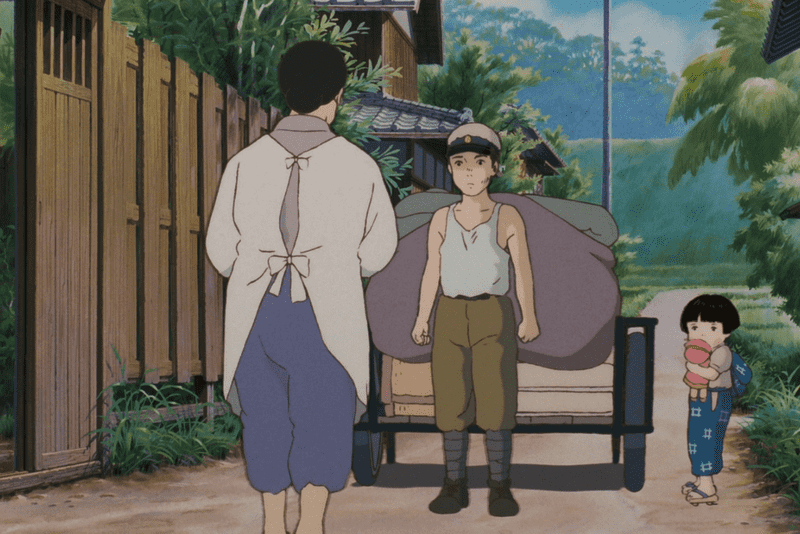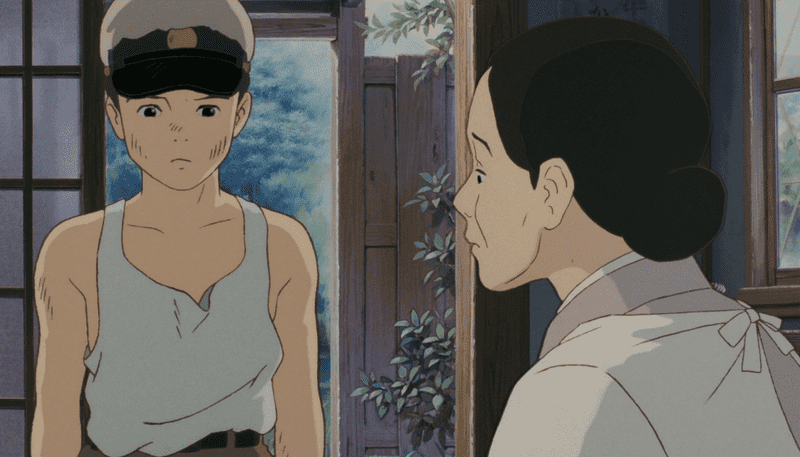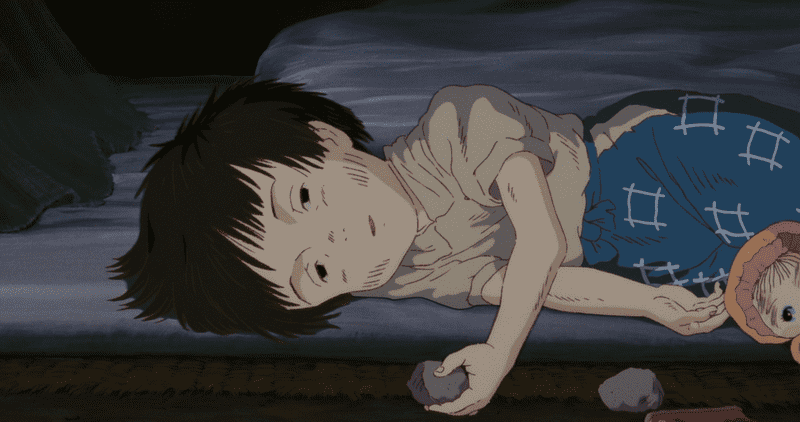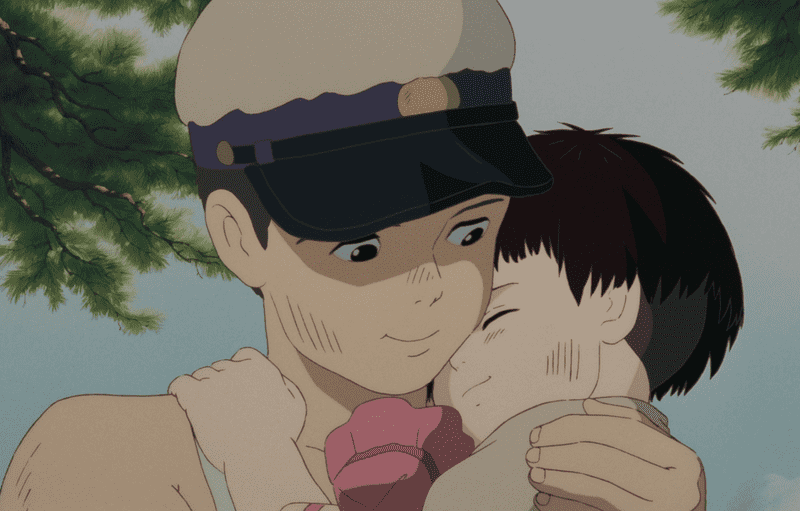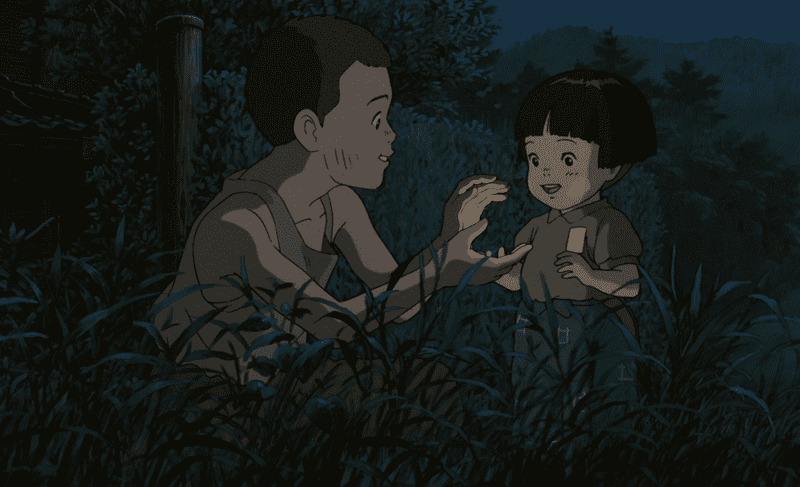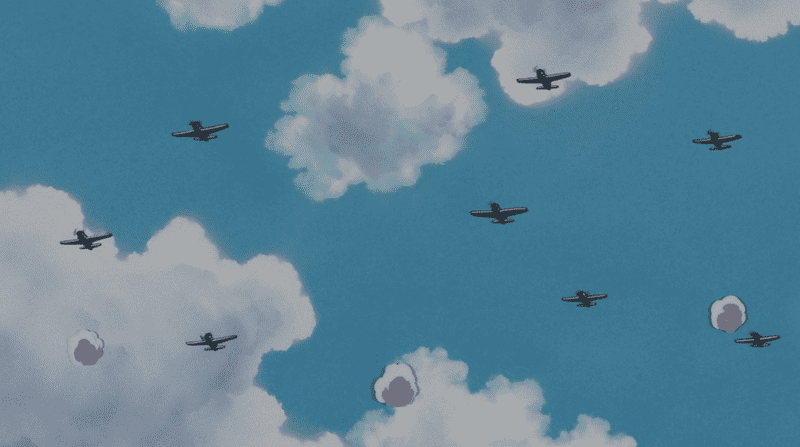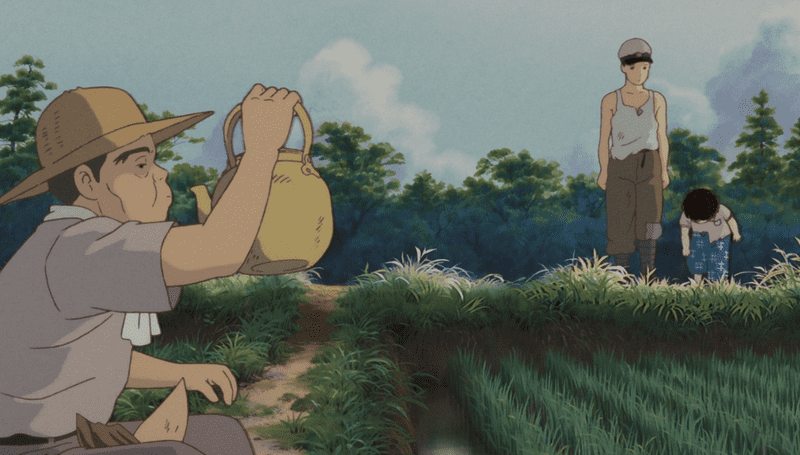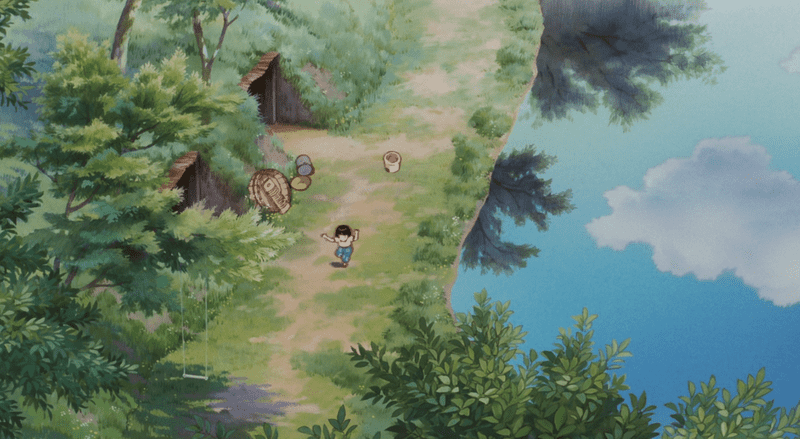Grave of the Fireflies
Grave of the Fireflies is a Studio Ghibli movie from 1988. It has all the charm and beauty of Ghibli movies and all of the tragedy as well.
I wanted to get some thoughts out about the movie fresh after watching it for the first time. I'm not sure who this post is for, but I did want to just write about how I feel about the movie as it is a very moving movie.
NOTE This is spoiler-full. I'm assuming you've either watched the movie or you're ok with spoilers.
A Quick Summary
I watched a few YouTube videos discussing and dissecting Grave of the Fireflies and they all agreed on one thing: there's an easy way to summarize the whole movie:
Seita dies at a train station from starvation. His dead spirit reunites with his younger sister Setsuko and we explore the events leading up to their deaths in the final months of World War II.
That's kind of it. We are immediately shown the ending and result of their struggle. The ghosts of Seita and Setsuko don't interact much with their past selves, occasionally displaying some emotion to give context to the scene. A little hindsight 20/20 situation.
We start the story in a city called Kobe and the firebombing that propels the characters to the mayhem that's to come.
Ending first?
I'm not usually a fan of the ending-first movies. In fact, I hate the whole "5 years earlier" unless it has to do with a mystery which in this case was not.
But in Grave of the Fireflies, this technique lends to upping that tragedy factor. We know the characters will die and that fact taints any semblance of hope presented in the movie and any "happy" moments because we know the happy moments will end and the hope is false.
I think that makes the whole movie much more tragic and despite being about an hour and a half, it feels much longer. The death isn't the twist and so it comes at the end after a rollercoaster of getting there. I think that lends to why it feels very long as well -- the climax of the story is mere minutes from the closing titles, unlike in other movies where climax happens 15ish minutes from the end.
When things go really south
Grave of the Fireflies isn't a one-way ticket to hell. There are definitely ups and downs. When Kobe is firebombed, our main characters walk away essentially unharmed.
But then their mother dies. Luckily, their aunt will take them in and help them. And things keep kind of going that way. A tragedy followed by a glimmer of hope followed by hardship.
I watched a YouTube video that tried to boil these events down to two types:
- people failing Seita and Setsuko -- not out of hate but due to their own hardship.
- Seita succeeding in temporarily making their situation better.
One video boiled it down further. Sometime in the movie, Seita decides that they can no longer stay with their aunt. He withdraws some money from their mother's bank account, and they leave to live in an abandoned bomb shelter.
I keep coming back to that moment. In any other movie, and especially in a movie that doesn't tell you the ending, this would be a moment of triumph. A moment where Seita and Setsuko find their own place and survive on their own.
But in this movie, you know that this decision will be at least partially responsible for their deaths. It's hard to watch because the movie treats them leaving as a triumph -- mirroring how the characters themselves feel about it.
At the same time, I can't imagine telling them to stay home in their current environment -- where they are yelled at, where Setsuko has screaming nightmares at night and is yelled at for it, where they sell their belongings and get very little food. On top of it, they are constantly harassed by the Aunt for not doing enough -- despite being children.
So what do you do in this situation? Do you risk things out there and try to be happy? Or do you stay in an abusive household?
It gets worse, too. By being out on their own, they don't even get food rations they'd get if they stayed with their aunt.
"Family"
Which brings me to Family. Family is very important in Japanese culture, you rely on your family to help you take care of things.
When Seita and Setsuko first arrive at their Aunt's, she is more than welcoming of them. When their mother dies and as food gets rationed and general poverty sets in, the Aunt can't take care of them as well anymore.
We see a transition from her being an anchor of safety in the movie -- playing with Setsuko, helping Seita, consoling the both of them etc. -- to becoming a character you dread seeing.
Eventually, she becomes resentful of their drain on the household. Seita gives the Aunt some Kimonos they had before the firebombing. And while she sells them to get a good deal of rice, she portions it so that Seita and Setsuko get very little.
The theme of family is constantly used in the story. Seita gets constantly asked if he had written to his father who was in the Navy. If he had gotten in touch with his family in Tokyo.
Whenever Seita asks for help from anyone, they turn him toward his family. A family made up of his father who never responds (and then we find out is dead), a family that cannot be found in Tokyo, and his Aunt who doesn't want them at her house.
Even when Seita tells people these things, they only shrug.
"Swallow your pride", they say.
One interesting after-effect of this is that I can imagine that if their mother was with them or another adult, they'd swallow their pride and value survivorship above one's mental health wellbeing. This is understandable but as children, Seita and Setsuko make a different decision that's valid to them even if it puts them at higher risk.
Money
The one weird thing in the story is how powerless money is. When Seita and Setsuko get their mother's money (which is supposed to be substantial amount), you get some hope. I got some hope (before rememebering the movie's hook).
Things come crashing down -- money ends up pretty worthless when you're hungry. So while Seita is able to use that money to buy some provisions early on, it's useless later when a farmer refuses to take his money altogether.
People barter but even the bartering reaches its limits as people no longer have a use for a nice dress (that, admittedly, Seita stole) and food is generally more important to people as time goes on.
Their mom left them in a good shape from all outside points of view: she left them with a trusted family member, she left them money. But neither fixed the issue.
The rash
A reccuring scene in the movie is Setsuko dealing with her rash. She gets a rash as a result of malnutrition and depending on if it's better or worse, you can kind of expect to know where things go.
It's really sad. You see this child struggling with hunger and then struggling with body ailments that she can't do anything about. Setsuko struggles to deal with it.
When he takes her to the doctor, finally, the doctor tells Seita that she needs to eat but refuses to answer where he should get food from.
The rash...bothers me. It bothers me eternally because even with Seita seems to be doing somewhat alright in the world, Setsuko is sick and you're constantly reminded of it -- when she goes for a swim in the ocean, when she scratches her body at all times, when she tells Seita she's itchy and not feeling well, and so on.
It's depressing because this child is struggling, everyone sees it, and no one lends a hand.
When Setsuko dies, spoiler alert, it's out of hunger and that hunger rash is basically a ticking clock for you to keep an eye on.
Note: The one thing I'm having trouble understanding is that even when they have food, Setsuko struggles to eat it. I've been racking my brain to figure it out. I'm guessing the varied frequency of when they get to eat messes with her system. I'm not ignorant to the fact that you can eat food and still be malnourished so I'm guessing that this is what happened as well as her diarrhea draining her body of anything it could use.
I hate how Setsuko died
We first encounter a near-death experience when Seita finds Setsuko collapsed on the ground near the end of the movie and prior to getting food. She has the iconic "bug" on her to show she's dead but then she wakes up. She's not dead. (the bugs show up on Seita's mother when she's dead and on Seita at the beginning of the movie when he dies).
Then her real death scene happens and I fucking hate it. I can't stand it. You see this child trying to eat marbles in delirium, pretending it's candy. You see this child pretending rocks are rice cakes.
And you see how fragile and tired she is, how hungry and sickly she is. You want her to get better. As a father of a four year old, I had to pause the movie constantly to get a handle on myself.
When Seita finally has food toward the end of her life, he gives Setsuko some watermelon and when she falls asleep, he runs off to prepare a meal so that she can start getting her strength back. Seita had spent the last of their money and because the war was over, money finally had some worth again and he could stock up on food.
A little too late though. Setsuko falls asleep and never wakes up.
Upon my second rewatch, I paid a little more attention to the scene and what brought me a small level of joy is that Setsuko died with a slight smile on her face after thanking Seita for the watermelon. But the thanks could be heard across the story. A "thanks for taking care of me" and that closed her chapter. Unlike other death scenes in other movies, there was nothing left to be said at this point, no loose ends in the story.
The solace of everyone's death
I've thought about her death a lot. If only she could have hung on. If only she could have survive just a little longer. If only Seita had known the war was over and he could get money and food. If only...I kept thinking.
This "if only" thing kept running through my head in the final moments of the movie made worse by my personal real life. A friend of mine died by suicide just a few days ago and I've been "if only"-ing it to no ends.
The only peace you'll get when seeing Setsuko die the way she did was made by the knowledge of how Seita died. He died of starvation as well but not surrounded by family, not in a place where he had made many positive memories, but in a train station where a janitor took his only posession and let him stay dead.
Seeing Setsuko die Setia's death would have been even more tragic because it's a witness to something else. Seita died after the war, after things started getting back to normal. Seita's death was very tragic but was written in such a way that it felt more like a release, a reunion with Setsuko because we never see the events leading up to his death, we only see him topple over and say Setsuko's name.
While Setsuko died as a result of the harships during the war, Seita died as a result of the hardships brought on by the war but fully realized after it was over showing that even when you mourn a defeat or celebrate victory, things will forever be different and the trauma and the scars of war will never truly heal.
The good memories
The montage of the movie where we see Setsuko enjoy her time at the bomb shelter, often alone while Seita tries to get food or improve their situation, is bittersweet.
She sees a dragonfly, marveling at it, and then we realize she had been alone all day. She jumps up from her swing to greet Seita when he comes back and that is in stark contrast to constantly following Seita and seeing him having to leave.
It's hard to think of them as "good memories" because they end tragically and the hook taints all of the good memories with that looming doom at the end. When I rewatched the movie and knew with certainty when Setsuko would die, it was easier to focus on the positive moments and they really do seem positive. I think that if the initial hook where we see their deaths wasn't there, it'd be easy to watch this movie and see it as another feel-good-in-bad-circumstances Ghibli movie and be completely blindsided and even betrayed by the ending. The allusions to Setsuko's death are few and far in between unless you know to look for them (which the hook ensures).
I can't stress how much I love the way this was done. I wish I could be as good of a writer/creator as the team and the screenwriters behind this movie.
But, the first time around, all I could think of was the fact that the two siblings had each other and in that, they could find some hope and comfort. The bomb shelter also ended up being a fairly safe place to stay. But all else was a reminder of the tragic end.
Other people's lives
Grave of the Fireflies has a tight focus on the siblings. I wish I could talk about them forever. But the movie likes to touch on how others are doing as well.
We see the lives of other villages that did not lose their houses. Seita steals food from their homes during air raids -- risking his life to survive.
Those people had food and though they might have lived on rations, they were far from where Seita and Setsuko were in their lives. In fact, they had many luxurious possessions which many others did not.
We also see the Aunt's life. She eats little but her and the others in her house survive. I don't remember who they were but the others were old enough to have jobs and contribute. The aunt did not live lavishly but she did survive.
At the very end, during Setsuko's funeral, Seita witnesses kids his own age returning to a summer home, excited to finally be back and be able to enjoy the house. All the while Seita is still starving and cremating his own younger sister.
There were a few other moments that I thought were impactful:
When Setsuko finds a dead person on the beach. No one knows what happens but one can assume.
When Seita steals from one home, we see a home behind him set on fire. To me, that was an allusion to what happened to Seita and Setsuko, possibly showing us that even now in the story, people will be made homeless and possibly suffer the same fate as Seita and Setsuko, after holding on for so long.
A group of children come and break some things at the sibling's bomb shelter. That scene is trying to communicate so much but all I could think was that here are some kids, enjoying life and being healthy, and making fun of how Seita and Setsuko are living.
Lastly, the scene at the beginning where see that Seita was just one among many others to follow the same path. In fact, the janitor shows us that it's so common, he no longer cares.
Military
One thing that keeps running in my head on repeat is Seita's and Setsuko's father who was a general of some sort in the Navy, fighting for Japan.
We find out he's dead all the way at the end when we find out Japan had lost the war.
One thing that bothers me about their dad's position is that he surely worried about his kids at home and continued fighting, possibly with no news from back home, to ensure his wife's and kids' safety.
So while their aunt is upset that Seita and Setsuko are doing nothing to help Japan, are not fighting in the war, etc., she glosses over the fact that their father is fighting hard at the frontlines.
His status initially helps Seita - they get better rations and they get help with evacuating from Kebo. But as time goes on, it's forgotten. The aunt constantly asks if Seita had written to his father. Then she stops asking.
It twists my mind that their Aunt didn't see it as more of her responsibility to look after them - partly as her own family and partly in line with her values when it came to her views of the military.
It baffles me further that the Aunt never checked on them even after the Japanese defeat. Or that she never went to inform them, or do anything at all to help them in the end.
Everyone failed Seita and Setsuko
Some Grave of the Fireflies breakdowns discuss how there's no main villain. I do believe there is, the war itself. The war, being a result of both Japanese actions and the actions of others, destroys the siblings piece by piece despite them having no choice in the matter, and no ability to change anything.
The secondary villain is people's hardships pushing them to be apathetic or downright mean, sometimes. It's hard to fault the people one by one, but it's definitely accurate to blame them as a whole. Just to recap some things:
- their Aunt. -- I've said enough about her
- doctor who diagnosed Setsuko's rash who didn't even care to respond where Seita could get food for her.
- farmer refusing to sell his food
- farmer that beat Seita for stealing food
- police officer that only offered Seita some water after Seita was brought in for stealing food for his sick and hungry sister
- the people walking by Seita as he was dying from hunger
- the people that wouldn't trade for Seita's stolen goods so he could buy food
It's hard to fault them (other than their Aunt). Should they have been responsible for the kids? No, not solely responsible. Could they have changed the siblings' fate? Absolutely -- every one of them could have. What about the unknown and invisible characters of the movie? The rich that had summer houses and seemed unaffected by the war? How about the middle class that still had their homes? What about the military that their father served?
What about the city where they stayed? Could they have had a better way to take care of their homeless orphans?
Final thoughts
This isn't an easy movie to watch. I hugged my kids very tightly this morning because honestly, this movie left a terrifying impact on me. It made me feel scared that if anything like that were to happen here, all of the safety of life would be gone and the same goes for my kids.
My kids' safety and well-being are priorities above everything else. Picturing them in Seita's and Setsuko's shoes is heart-wrenching and terrifying in how there's a thin strand of uncontrollable circumstances separating their lives from mine.
The movie showed the hardship of war and how people far removed from war.
And I can't stop wishing for these siblings. Wishing that their mother had miraculously survived the initial bombing. Wishing that Seita could have gotten food for Setsuko earlier. Wishing that all the people that failed them had helped. Wishing that their Aunt recognized the hardship they were enduring.
I can't help but wish.
Real issue in real life
To top this off though, I try to keep in mind that these issues presented in the movie are real issues -- and they're real issues today. Not only are the semi-autobiographical (meaning that some of this really happened) and representative of the struggles of the era (meaning that people did experience this level of hunger/poverty/death), but they're representative of today's world as well.
Go read about world hunger to learn about it. One fact from the page that stands out is that approximately 815 million people suffer from chronic undernourishment. 815 MILLION people. MILLION. Can you believe it?
World War II wasn't the last war and conflicts continue all over the world, displacing and killing entire families. The Yemen Crisis on its own resulted in 14 million people at risk of starvation and death. 14 million people in Seita's and Setsuko's shoes.
To put this into terrifying perspective, about 360,000 children under 5 (Setsuko's age and younger) are suffering as she did.
Poverty still exists in every country in the world with similar effects -- even during prosperous and peaceful times.
I know people today, some of them friends, that struggle to feed their children, struggle to provide them with adequate healthcare and a happy childhood as well as safety -- and this is outside of any warzone.
I'm not sure how to wrap this up but I want to keep these hardships in mind. We have the means as a society to eliminate them and we have the means to make these situations worse -- and the continuing wars and refugee crises are a testament to this seemingly-endless suffering.
